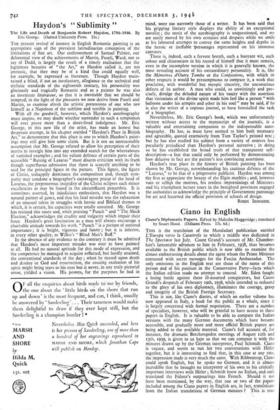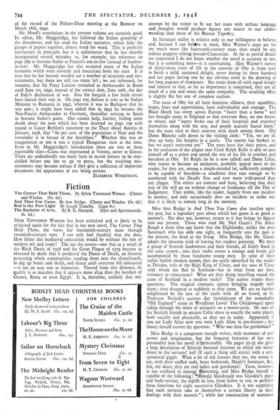Ciano in 'English .
Ciano's Diplomatic Papers. Edited by Malcolm Muggeridge ; translated
THIS is the translation of the Mondadori publication entitled L'Europa verso la Catastrofe to which a middle- was dedicated in The Spectator last July. Count Grandi's account of Mr. Chamber- lain's lamentable advances to him in February, 19348,- thus becomes available to the British public which is now able to examine the almost embarrassing details about the agent whom the Prime Minister entrusted with secret messages for the Fascist Ambassador. The only omissions in the English text are those of the name of this person a[nd of his position in the Conservative Party—facts which the Italian edition made no attempt to conceal. Mr. Eden fought a losing battle against these ill-assorted conspirators but Count Grandi's despatch of February 19th, 1938, while intended to redound to the glory of his own diplomacy, illuminates the courage, grasp and integrity of the British Foreign Secretary.
This is not, like Ciano's diaries, of which an earlier veltune has now. appeared in Italy, a book for the public as a whole, since it
• is largely concerned with formal negotiation. There are a number of specialists, however, who will be grateful to have access to these papers in English. It is valuable to be able to compare the Italian versions with the many German documents which have become accessible, and gradually more and more official British papers are being added to the available material. Ciano's full account of,- for instance, the dramatic Berchtesgaden meetings of August 12th and 13th, 1939, is given to us hice so that we can compare it with the minutes drawn up by the Gentian interpreter, Paul Schmidt. Ciano is vaguer, and seems to run his two conversations with Hitler together, bu't it is interesting to find that, in this case at any rate, 'the impression made is-very much the same. With Ribbentrop, Giant) could speak English, but he spoke no German, and it is alitiost incredible that he brought no interpreter of his own to his critically important interviews with Hitler ; Schmidt knew no Italian, and only translated the Fiihrer's outpourings into French. Should it not have been mentioned, by the way, that one or two of the papers included among the Ciano papers in English are, in fact, translations from the Italian translations of German minutes ? This is true
of the record of the Fiihrer-Duce meeting at the Brenner on March 18th, 1940.
Mr. Hood's translations in the present volume are certainly good. - Its editor, Mr. Muggeridge has followed the Italian grouping of the documents, and has used the Italian narrative, which links the groups of papers together, almost word for word. This is perfectly satisfactory in principle, but it is unfortunate that he has thereby incorporated several mistakes as, for example, the reference on page 289 to Serrano Sul-ler as Franco's son-in-law (instead of brother- in-law). Mr. Muggeridge has also accepted many of the Italian footnotes which were slovenly and inaccurate, from the start. It is true that he has bravely weeded out a number of misprints and mis- statements but there are still too many left ;-We are informed, for instance, that Sir Percy Loraine remained as Ambassador in Rome until June 1st, 1940, instead of the correct date, June loth, the day of Italy's declaration of war. Into the bargain a few fresh errors have forced their way in. On page 105 Anfuso is sent to be Italian Minister to Rumania in 1942, whereas it was to Budapest that he was sent ; it might have been added that in 1943 he became the Neo-Fascist Ambassador to Germany, therealter retiring to Spain as Serrano Sutler's guest. One cannot help, further, feeling some doubt about the note which has been inserted on page 159 with regard to Count Bethlen's statement to the Duce about Austria in January, 1938, that "8o per cent, of the population is Nazi and the remainder is in favour of the Anschluss." Whether this was an exaggeration or not it was a typical Hungarian view at the time. Even in Mr. Muggeridge's introduction there are two or three regrettable slips—Ciano was imprisoned at Verona, never at Genoa. There are undoubtedly too many facts in recent history to be mar- shalled before one has to go to press, but the resulting mis- statements may become serious if they give' a collection of important documents the appearance of not being serious.
ELIZ4BETH WISKEMANN.



































 Previous page
Previous page